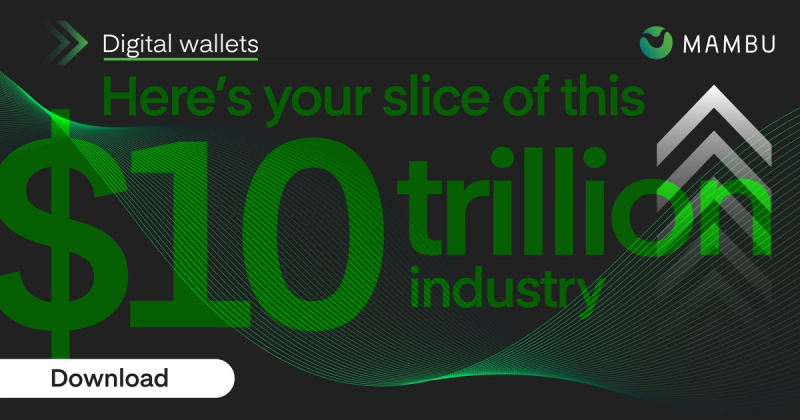From consumers to businesses, the allure of convenience, versatility, and accessibility has made digital wallets an unstoppable force. What was once considered an alternative payment method has transformed into a mainstream financial tool, catalysed by the rise of smartphones, eCommerce, and contactless technology.
Download our research Digital wallets: How to get your slice of a $10 trillion industry to learn how businesses like yours, whether a bank, a fintech or a non-bank, can reap the benefits of this lucrative and highly customer-centric opportunity.
Free report
Digital wallets’ transition from alternatives to essentials has led to a staggering 2.8 billion users engaging in online transactions, spending $5.5 trillion in 2020 alone. Fast-forward to 2027, and these numbers are projected to surge further, contributing to a colossal $15 trillion market. Projected to embrace 60% of the global population by 2026, digital wallets present a strategic tool capable of propelling businesses towards exponential growth.
One of the major factors driving the growth of the digital wallet market in Europe is the increasing adoption of contactless payments. Europeans appreciate the convenience and speed of contactless transactions, which have become a preferred payment method for everyday purchases. Mobile banking has contributed significantly to the growth of digital wallets in Europe. The convenience of combining banking and payment functions in one platform has driven the adoption of digital wallets among mobile banking users and further accelerated market growth. The most popular digital wallet providers in the region are PayPal, Apple Pay, and Google Pay.
More than a wallet
Digital wallets are well-poised to offer an array of supplementary services and features. From promotions and couponing to rewards and geofencing marketing capabilities, these wallets serve as catalysts for innovation.
This is evident in the growing number of fintechs that are exploring and experimenting with eWallets. Fintechs are customising their services to cater to the specific needs of their user base. Take, for instance, the pan-European digital bank N26, which enables its customers to effortlessly split bills and even retroactively manage payments, offering a unique Buy Now Pay Later feature that resonates with their audience.
Digital wallets have not only accelerated innovation but have also significantly enhanced customer experiences and expanded customer bases. Take our customer and Portuguese retailer, Sonae. Its Universo programme merges store, partner loyalty, and payment cards into one card, helping it to improve retention and provide financial services, such as loans and insurance. Adding a digital wallet to house all this functionality, made the process much easier and more streamlined.
Alongside innovation, digital wallets introduce remarkable efficiency and cost savings compared to traditional services. Remittance and forex, which have historically yielded substantial profits for banks, have been disrupted by the advent of digital wallets. Offering near-instantaneous transactions with lower fees, digital wallets have turned the tide, enabling international money transfers within a minute at low commissions.
Fast lane to digital wallet success
Seeing digital wallets as essential for strategic growth, has prompted both traditional banks and non-banking institutions to invest in their own cloud-based solutions. Opting for a cloud-native banking platform from a partner, like Mambu, can unlock an array of benefits.
- High speed to market
Mambu is cloud-native meaning that there are no local hardware requirements and deployment can take weeks not months. - Flexibility and composability
Third party solutions can be easily integrated, adapted and changed if and when required, without vendor lock-in. - Lower total cost of ownership
Mambu requires fewer resources, no big capital investments, and comes with lower maintenance costs and automatic upgrades.
Understanding the product roadmap and the key business differentiator is crucial. Mambu’s composable approach minimises risk and enhances success potential by managing each solution's application scope, from CRM and ERP to core and channels. The crux lies in creating an architecture that is open and simple, identifying the scope of each solution, and recognise execution capacity. A decoupled setup between channels and backend systems is fundamental to be able to scale quickly.
For example, our partner Enfuce leads in integrating global digital wallets, enabling seamless card integration with major platforms like Apple Pay, Google Pay, and Samsung Pay. This service allows users to quickly and securely add physical or virtual cards to digital wallets, with the ability to launch wallets in just three months and issue virtual cards instantly. Similarly, Jumio, a leader in online and digital identity verification, ensures secure digital wallet launches. By verifying digital identities from trusted sources Jumio promotes interoperability, allowing users to access their digital identity seamlessly across platforms.
Digital wallets operate through encrypted, verified transfers between accounts or platforms. Currencycloud strengthens this by seamlessly integrating cross-border payments and FX functions, ensuring control over the user experience. Its API-driven approach simplifies implementation, expediting innovation while cutting risks, costs, and complexities for digital wallets and financial platforms.
As big tech players show increasing interest in the financial arena, there's a substantial opportunity for companies to convince consumers to swap traditional metal, paper, and plastic for 21st-century alternatives like digital wallets.
Find out more about how Mambu's cloud-native banking platform empowers financial institutions around the world with cost-effective back-end functionality, quick loan delivery, and seamless scalability, in our Digital wallets: How to get your slice of a $10 trillion industry research.
